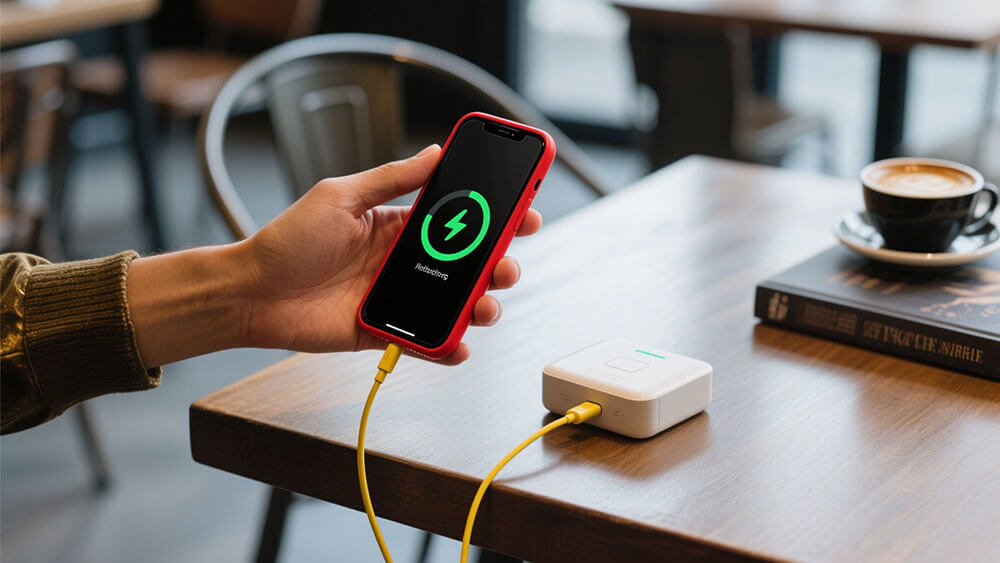Contents

When choosing the best Handheld Devices Lithium Battery, energy density and lifespan are critical factors. Lithium-ion batteries excel in these areas. They offer an energy density exceeding that of lead acid batteries, measured in watt-hours per kilogram, and a lifespan ranging from 2 to 10 years, depending on usage. Additionally, lithium batteries provide cost-effective solutions for portable electronics, supported by data from over 3 billion NMC/C+SiO cells tested under diverse conditions. For specialized applications requiring lightweight and flexible designs, lithium-polymer batteries stand out as a viable option for handheld devices.
Key Takeaways
Lithium-ion batteries work well for handheld devices. They store lots of energy and are affordable. They are great for phones and tablets.
Lithium-polymer batteries are light and flexible. This makes them good for wearables and drones. Their thin shape makes devices easier to hold.
Safety matters when picking batteries. LiPo batteries handle heat better. Both types need protection to stay safe.

Part 1: Key Comparison Factors for Handheld Devices Lithium Battery
1.1 Performance and Energy Density of Lithium-ion Batteries vs. LiPo
When evaluating battery performance for handheld devices, energy density becomes a critical factor. Lithium-ion batteries (Li-ion) outperform lithium-polymer batteries (LiPo) in this area, offering energy densities between 160-270 Wh/kg compared to LiPo’s 130-200 Wh/kg. This higher energy density makes Li-ion batteries ideal for portable electronics like smartphones and tablets, where maximizing power within a compact design is essential.
LiPo batteries, however, excel in applications requiring flexibility and lightweight construction. Their ability to achieve slimmer profiles, as thin as 0.5mm, makes them suitable for wearable devices and compact and lightweight devices. While Li-ion batteries provide consistent performance across various applications, LiPo batteries cater to niche markets where design constraints take precedence over raw energy density.
1.2 Weight and Size Considerations for Lithium Battery Types
Compact size and weight are vital for handheld devices. Li-ion batteries feature a rigid structure, limiting their shape options. In contrast, LiPo batteries offer flexibility, allowing manufacturers to design slimmer and more compact devices. For example, LiPo batteries can achieve capacities higher than 10Ah without requiring special packaging, making them suitable for high-performance devices like drones and medical equipment.
Li-ion batteries remain the best lithium battery for applications requiring a balance between energy density and cost. Their rigid design supports reliable integration into devices where compact size is less critical. On the other hand, LiPo batteries are preferred for wearable devices and applications requiring long life due to their lightweight and adaptable form factor.
1.3 Safety and Thermal Stability in Li-ion and LiPo Batteries
Safety profiles differ significantly between Li-ion and LiPo batteries. Li-ion batteries, while offering higher energy density, pose risks such as thermal runaway. This phenomenon occurs when a cell becomes thermally unstable at temperatures above 150°C (302°F), potentially leading to a chain reaction. Historical incidents, such as the Samsung Galaxy Note 7 recall, underscore the importance of robust safety mechanisms in Li-ion battery technology.
LiPo batteries, with their solid electrolyte design, exhibit better thermal stability. They are less prone to leakage and explosion, making them safer for applications where reliability is paramount. However, external protection mechanisms remain crucial for both lithium battery types to mitigate risks during operation.
1.4 Cost and Manufacturing Efficiency of Lithium Batteries
Cost considerations often influence the choice of lithium battery types. Li-ion batteries have a lower manufacturing cost due to their established production processes and widespread availability. This makes them the preferred choice for mass-market handheld devices like smartphones and gaming consoles.
LiPo batteries, while more expensive to produce, offer unique advantages in specialized applications. Their flexible design and ability to achieve higher capacities justify the higher cost for industries requiring custom battery solutions. For businesses seeking cost-effective options, Li-ion batteries remain the best lithium battery for general-purpose use.
1.5 Charging Speed and Efficiency of Lithium Battery Types
Charging capabilities vary between lithium battery types. Li-ion batteries typically charge at a rate of 0.5-1C, balancing speed and energy density. LiPo batteries, on the other hand, support faster charging speeds of up to 2C, making them suitable for applications requiring quick turnaround times.
For portable electronics, where energy density and charging efficiency are critical, Li-ion batteries provide a reliable solution. LiPo batteries cater to scenarios where faster charging and higher capacities are necessary, such as drones and wearable devices. Manufacturers must evaluate battery performance metrics to select the most suitable option for their products.

Part 2: Applications of Lithium-ion Batteries and LiPo in Handheld Devices
2.1 Smartphones and Tablets: Choosing the Right Lithium Battery
Smartphones and tablets demand high-performance batteries to support their advanced features and prolonged usage. Lithium-ion batteries dominate this segment due to their superior energy density and long lifespan. These batteries can store more energy in a compact form, making them ideal for portable electronics where space is limited. Their ability to maintain consistent performance over hundreds of charge cycles ensures reliability for daily use.
Lithium-polymer batteries, while less common in smartphones, are occasionally used in premium or ultra-slim models. Their flexible design allows manufacturers to create thinner devices without compromising battery capacity. However, their higher production cost makes them less suitable for mass-market devices. When choosing a battery for smartphones or tablets, you should prioritize energy density, cost-effectiveness, and durability, which makes lithium-ion batteries the preferred option.
2.2 Wearables and Fitness Trackers: Li-ion vs. LiPo
Wearable devices like fitness trackers and smartwatches require lightweight and compact batteries. Lithium-polymer batteries excel in this category due to their thin and flexible design. These batteries can be molded into various shapes, enabling manufacturers to create sleek and ergonomic devices. Additionally, their lower risk of leakage enhances safety, which is crucial for wearables that remain in close contact with the skin.
Li-ion batteries, while offering higher energy density, are less commonly used in wearables due to their rigid structure. However, they may still be suitable for larger devices like smart glasses or hybrid wearables where size constraints are less critical. For most wearables, lithium-polymer batteries provide the optimal balance of weight, size, and performance.
2.3 Gaming Consoles and Controllers: Lithium Battery Types
Gaming consoles and controllers require batteries that deliver consistent performance during extended gaming sessions. Lithium-ion batteries are the go-to choice for these devices. Their high energy density ensures longer playtime, while their ability to handle frequent charging cycles makes them durable for heavy usage.
Lithium-polymer batteries are less common in gaming devices but may be used in specialized controllers or portable gaming consoles where weight and size are critical. For example, a slim handheld console might benefit from the lightweight design of a lithium-polymer battery. However, for most gaming applications, lithium-ion batteries remain the best lithium battery due to their cost-effectiveness and reliable performance.
2.4 Specialized Devices: Li-ion and LiPo for Drones and Medical Equipment
Specialized devices like drones and medical equipment have unique battery requirements. Drones, for instance, need batteries with high capacity and discharge rates to support long flight times and stable performance. Lithium-polymer batteries are often used in drones due to their lightweight design and ability to deliver high power output.
Medical equipment, on the other hand, often relies on lithium-ion batteries due to their long lifespan and stable performance. Devices like portable oxygen concentrators and infusion pumps benefit from the high energy density and reliability of lithium-ion batteries. These batteries ensure uninterrupted operation, which is critical in medical applications.
When selecting a battery for specialized devices, you should consider the specific requirements of the application. Lithium-polymer batteries are ideal for lightweight and high-power needs, while lithium-ion batteries excel in scenarios requiring durability and consistent performance.
Choosing the right battery for handheld devices depends on your specific needs. Lithium-ion batteries offer high energy density, cost efficiency, and widespread availability, making them ideal for most portable electronics. Lithium-polymer batteries, on the other hand, excel in lightweight and flexible designs, perfect for wearables and drones.
To make an informed decision, evaluate performance, safety, and cost. The BatPaC model provides insights into manufacturing costs and energy density comparisons, validated against real-world applications.
By assessing these factors, you can select the battery type that aligns with your device’s requirements and market goals.
FAQ
1. What are the main differences between Li-ion and LiPo batteries?
Li-ion batteries offer higher energy density and cost efficiency. LiPo batteries provide lightweight, flexible designs. Choose based on your device’s size, weight, and performance needs.
2. Are LiPo batteries safer than Li-ion batteries?
LiPo batteries have better thermal stability and lower leakage risks. However, both require proper protection mechanisms to ensure safe operation in handheld devices.
3. How can Large Power help with custom battery solutions?
Large Power specializes in custom lithium battery solutions tailored to your device’s needs. Visit Custom Battery Solutions for expert guidance.





